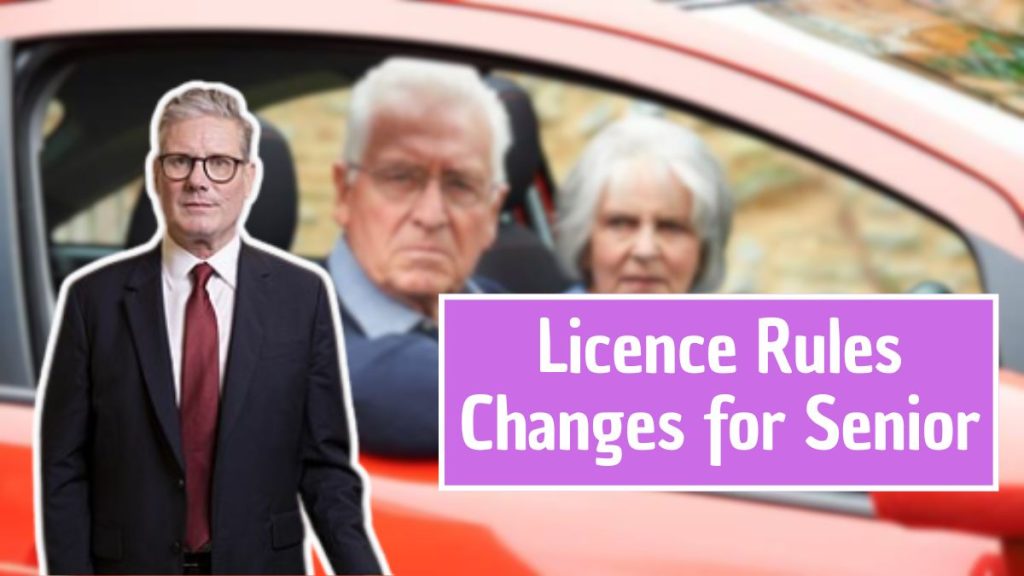For millions of older drivers in the UK, holding a driving licence is more than a legal requirement. It represents freedom, self-reliance, and a lifeline to essential services and family connections. Driving allows pensioners to manage daily tasks like shopping, attending medical appointments, and staying socially active without relying on public transport. But from October 2025, significant changes are coming for drivers aged 70 and above.
A New Era for Senior Drivers in the UK

These new policies, known as the UK elderly driving licence rules, aim to strike a careful balance between safety and independence. With over five million drivers in this age group, the government has introduced reforms to ensure that senior motorists are medically and physically fit to drive while preserving their independence. This article breaks down what’s changing, who it affects, and how to prepare for the transition.
What the UK Elderly Driving Licence Rules Mean (2025 Update)
From October 2025, renewing a driving licence after 70 will no longer be a simple declaration of fitness. The government now requires senior drivers to submit proof of a recent eye test, a medical clearance certificate from a GP, and in some cases, more frequent renewals depending on their health.
This shift follows growing concern about the safety of older motorists. Conditions like impaired vision, slower reflexes, or chronic illnesses such as diabetes or heart disease can affect road safety. The new system ensures that those fit to drive can continue confidently while identifying cases that require medical oversight.
Overview of the New Driving Licence Rules for Over-70s
| Key Aspect | Details |
|---|---|
| Start Date | 1 October 2025 |
| Vision Test Requirement | Proof of eye test within the past two years |
| GP Medical Confirmation | Mandatory health certificate signed by a GP or healthcare professional |
| Renewal Period | Three years for most drivers; one year for those with medical conditions |
| Digital Renewal Portal | Online platform for submitting documents |
| Paper Applications | Still available for non-digital users |
| Penalties for Non-Compliance | Fines up to £1,000 and possible licence disqualification |
| Renewal Costs | Licence remains free; medical and optician fees may apply |
| High-Risk Drivers | Stricter checks for drivers with conditions like diabetes, dementia, or heart disease |
| Family Role | Families encouraged to assist older relatives with renewals |
Why the Rules Are Changing
The UK government regularly reviews driving and safety laws, especially as the population ages. Today, there are more than five million licensed drivers aged 70 and above, and this number is expected to climb sharply over the next decade.
While many older drivers are safe, responsible, and experienced, age-related conditions can gradually impact their ability to drive safely. The new system aims to reduce accidents caused by deteriorating eyesight or undiagnosed health problems while maintaining the freedom older drivers cherish.
The UK’s reforms follow the example of countries like Australia, Canada, and several EU nations, where mandatory medical or vision checks for older drivers are already the norm.
The Current Rules for Drivers Over 70
Currently, senior drivers only need to renew their licence every three years and self-certify that they are medically fit to drive. No eye or health tests are required unless voluntarily disclosed.
Safety advocates have argued that this system is outdated and fails to reflect the modern realities of road use. The coming reforms will close that gap, ensuring medical oversight while keeping renewal simple for those in good health.
What’s Changing from 1 October 2025
From October 2025, five major updates will take effect for drivers aged 70 and above:
- Mandatory Eye Tests: Proof of a recent eye exam (within two years) must be provided during renewal.
- Compulsory GP Clearance: A doctor or certified healthcare professional must confirm that the driver is medically fit.
- Shorter Renewals for High-Risk Drivers: People with certain health conditions will renew annually.
- Digital Renewal System: The new online portal will simplify submissions, though paper forms remain available.
- Fines for Non-Compliance: Failure to renew properly or provide accurate information could result in fines up to £1,000 or disqualification.
How to Renew Your Licence After Age 70
Starting October 2025, older drivers will follow a step-by-step process to renew:
- Book an Eye Test: Visit a registered optician and obtain a certificate showing your vision meets legal standards.
- Obtain a Medical Certificate: Schedule a GP appointment to assess your overall health and get a signed clearance.
- Submit Your Renewal: Use the DVLA digital portal or post a paper application.
- Keep Documents Ready: Maintain copies of your test results and medical certificates for future renewals.
Most renewals should process within two weeks, though cases requiring further review may take longer.
Will Renewal Cost More for Pensioners?
While the licence renewal remains free, the new requirements could lead to small out-of-pocket costs. Eye tests usually range between £20–£30, and GP medical certificates may be free or charged privately. The government acknowledges this concern and may explore discounts or reimbursement options for low-income pensioners.
Who Will Be Most Affected by the New Licence Rules
The biggest impact will be felt by:
- Drivers with Medical Conditions: Annual renewals for those with diabetes, epilepsy, or dementia.
- Rural Pensioners: Limited access to doctors or opticians could delay renewals.
- Elderly Drivers Relying on Family: Relatives may need to assist with online applications or document collection.
Benefits of the 2025 Driving Licence Reforms
Although some see the changes as restrictive, the government insists they are intended to protect—not penalize—senior drivers.
Key benefits include:
- Safer roads through verified medical and vision checks.
- Greater confidence for families that older relatives can drive safely.
- Faster processing through digital renewal systems.
- Encouragement of regular health monitoring among older adults.
Concerns and Criticism
Critics warn that the new rules could strain GP services, increase costs for pensioners, and lead to social isolation if older drivers lose their licences. Advocacy groups have urged the government to ensure support for vulnerable seniors, particularly those in rural or low-income communities.
Officials have confirmed that the policy will be reviewed after its first year, with potential adjustments based on public feedback.
Preparing for Renewal: Practical Tips for Drivers Over 70
To avoid stress or last-minute issues, over-70 drivers should:
- Schedule annual eye tests regardless of renewal dates.
- Disclose medical conditions honestly to the DVLA.
- Begin the renewal process three months before expiry.
- Maintain good health and mobility through regular activity.
- Explore alternative transport options like senior bus passes or community taxis.
The Role of Families in Supporting Older Drivers
Family members play a crucial role in helping elderly relatives through the renewal process. They can assist with online applications, booking medical exams, and ensuring deadlines are met. Open discussions about driving safety can also reduce anxiety and prevent potential risks.
A Global Shift Toward Safer Senior Driving
The UK’s 2025 reforms align with a broader international push toward age-aware driving safety. Countries like Australia, Canada, and Sweden have introduced periodic medical reviews for senior drivers. This approach recognizes that while experience remains valuable, health and vision must be routinely verified to ensure safety for all road users.
Looking Ahead
The upcoming UK elderly driving licence rules mark one of the most significant policy shifts for older drivers in decades. While they introduce more responsibility, they also promise safer roads and greater confidence for both drivers and families.
By preparing early, maintaining health, and embracing the new system, older Britons can continue to enjoy the independence of driving—safely and responsibly—for years to come.
FAQs on the UK Elderly Driving Licence Rules 2025
1. When do the new elderly driving licence rules start?
The new rules take effect on 1 October 2025, applying to all UK drivers aged 70 and above.
2. Will I have to pay to renew my licence?
No. The licence renewal remains free, but you may need to pay for eye tests or GP medical certificates.
3. Can I still apply by post if I don’t use the internet?
Yes. The paper renewal option will continue alongside the new digital portal.
4. What happens if I forget to renew on time?
You could face a fine of up to £1,000 and possibly lose your right to drive until you renew correctly.
5. Will my medical condition automatically disqualify me from driving?
Not necessarily. Each case will be reviewed individually. Many drivers with managed conditions can continue driving with annual ren














